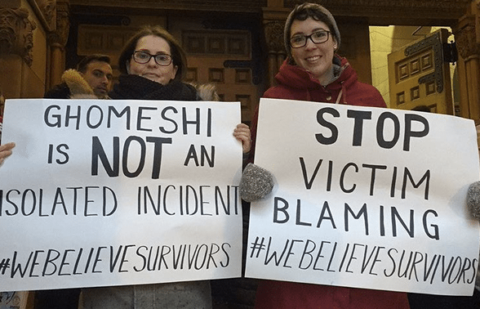How can we prevent what happened to Jian Ghomeshi’s accusers from happening again?

Former CBC broadcaster Jian Ghomeshi was found not guilty of four counts of sexual assault and one count of overcoming resistance by choking earlier today. As Judge William Horkins read his verdict, a list of reasons were provided, chiefly his reasonable doubt in the truth of the victims’ testimonies. “The harsh reality is that once a witness has been shown to be deceptive and manipulative in giving their evidence, that witness can no longer expect the Court to consider them to be a trusted source of the truth,” it reads. “I am forced to conclude that it is impossible for the Court to have sufficient faith in the reliability or sincerity of these complainants. Put simply, the volume of serious deficiencies in the evidence leaves the Court with a reasonable doubt.”
Support for the victims has sprouted up around Toronto—a rally organized by the Centre for Women and Trans People will place at 5:30 p.m—but today’s verdict has left many (FASHION editors included) in a state of disillusionment with the legal system, the burden of proof and the odds stacked against the Ghomeshi accusers who were brave enough to come forward. We’re all asking the same question: How can we prevent the damage of the Ghomeshi trial from happening again? How can we ensure that the accused is the one who has to prove him/herself—not the accuser? Part of it is by ensuring that the right steps are taken following an assault.
Here are some helpful tips to keep in mind if you’ve been sexually assaulted or know someone who has been:
Seek medical help
This is a tough one for many people, as there is a lot of confusion and unnecessary shame that comes with sexual assault. Visiting a hospital or sexual assault clinic can be the first step in connecting you with people you may need, such as doctors, counsellors and legal advisors (call a helpline to find the closest one to you). There, you can get a rape kit done. “The nurses [at the Sexual Assault/Domestic Violence Care Centre] take a forensic kit,” says Bobbie McMurrich, associate executive director of the Victim Services Toronto. “So they take all of the physical evidence, and they will do that if the victim requests and store it for them if they’re not ready to go forward to the police. That’s a really important piece.”
If you are considering speaking to the police, you might want to think about preserving evidence. According to the Rape Treatment Center of the UCLA Medical Center: “Do not shower, bathe, douche, eat, drink, wash your hands, or brush your teeth until after you have had a medical examination. Save all of the clothing you were wearing at the time of the assault. Place each item of clothing in a separate paper bag. Do not use plastic bags. Do not clean or disturb anything in the area where the assault occurred.” (Though this sounds daunting, and is likely not always possible.)
Call the Police
This can be extremely intimidating for many victims, and for some people it might take time to be able to make the call. “It’s not necessarily everybody’s first reaction,” says McMurrich. “It really depends on the circumstances and if the danger is continuing and imminent. One of the things that’s important is that people understand what to expect from the system, so they can go in knowing that it’s not going to be easy. If they go to court it will be adversarial and they’ll be made to feel that they’re on trial.” If possible, have a close friend or family member with you for support. (Here, what one witness at the Ghomeshi trial wished she knew before testifying.)
Seek Legal Representation
In the emotional aftermath of an assault, figuring out one’s rights can be overwhelming. “[Victims] are not required to have a lawyer, but they have really very little voice in the criminal justice system,” says McMurrich. “I think you know that one of the victims in the Ghomeshi trial did have legal representation. In Toronto, the Barbra Schlifer Commemorative Clinic is amazing.” Though hiring a lawyer is out of reach for many financially, there are free and lower cost services for victims, like the Independent Legal Advice for Sexual Assault Survivors Pilot Program.
Get Counselling
No matter how much time has passed since an assault, you can always seek counselling to help you deal with the lasting emotional implications. Most helplines, including that of Victim Services Toronto, will connect victims with counsellors and/or therapists. This can help in the decision-making process following an assault. “We will support whatever decision our clients make—they might decide one day this is the route they want to take and it may change the following day, and that’s fine,” says McMurrich.
Helplines across Canada:
ONTARIO
Victim Services Toronto
(416) 808-7066
Ontario Coalition of Rape Crisis Centres (listing of multiple helplines)
ALBERTA
Central Alberta Sexual Assault Support Centre
1 (866) 956-1099
MANITOBA
Klinic Community Health Sexual Assault Crisis Line (24/7)
In Winnipeg: (204) 786-8631
Toll Free in Manitoba: 1-888-292-7565
BC
Women Against Violence Against Women
24-Hour Crisis Line: (604) 255-6344 or toll-free 1 (877) 392-7583
QUEBEC
Quebec Coaliton of Sexual Assault Centers
Provincial helpline 1 (888) 933-9007
SASKATCHEWAN
Sexual Asssault Services of Saskatchewan
24 HOUR Sexual Assault Phone lines
Saskatoon (306) 244-2224
Regina (306) 352-0434
NEW BRUNSWICK
Fredericton Sexual Assault Centre
(506) 454-0437
PEI
Prince Edward Island Rape and Sexual Assault Centre
(902) 368-8055








